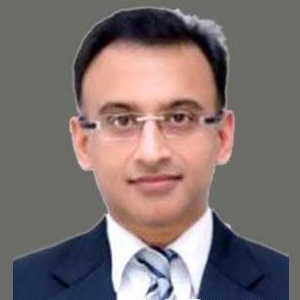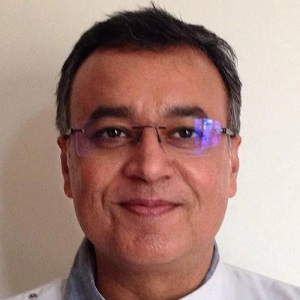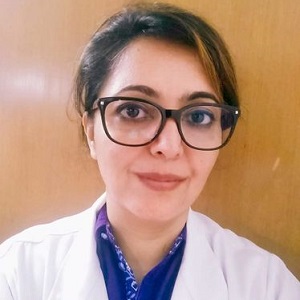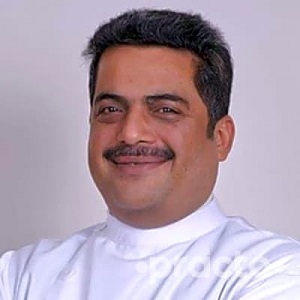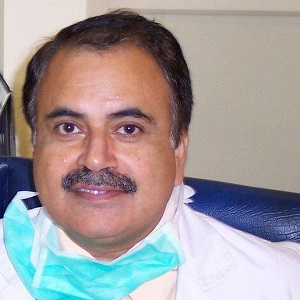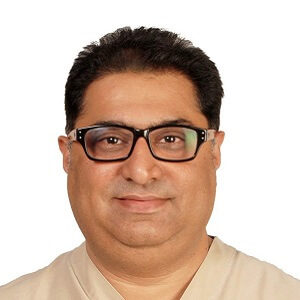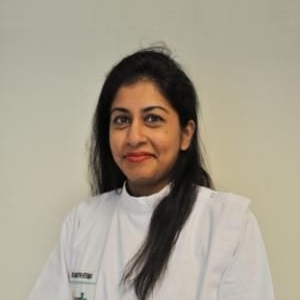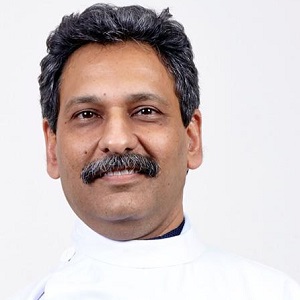Best Doctors in India for Veneers
- Dentist and Dental Surgeon, New Delhi, India
- Over 21 years’ experience
Profile Highlights:
- Dr. Adosh Lall is one of the best dentists in India. He is having an experience of over 21 years.
- He has been involved in imparting education to graduate and postgraduate students for 14 years. Also, he is an examiner of postgraduate students in India and Nepal.
- Dr. Adosh Lall has treated innumerable patients successfully in his past years as a dentist.
- Dentist, New Delhi, India
- Over 24 years’ experience
Profile Highlights:
- Dr. Jatin Ahuja is one of the most successful Orthodontists who has 24 years of experience in this field.
- He has performed numerous operations related to oral cavities in India and abroad.
- He has been treating several diseases related to oral health.
- Dentist, New Delhi, India
- Over 27 years’ experience
Profile Highlights:
- Dr. Smriti Bouri is a leading female Dental consultant who has been serving people for the last 27 years.
- She has performed a wide array of procedures all related to dental care.
- She served in the Indian Army during the early years of her career as a dentist.
- Dentist, Gurugram, India
- Over 20 years’ experience
Profile Highlights:
- Dr. Ravi S Batra is one of the most popular faces in the Department of Dentistry.
- He has 16 years of experience in treating patients who belong to different age groups.
- Dr. Batra has expert hands in diagnosing and treating orthodontic problems which mostly need surgical rectification.
- Dentist and Dental Surgeon, New Delhi, India
- Over 35 years’ experience
Profile Highlights:
- Dr. Neeraj Verma is one of those prominent dentists in India who is having more than 35 years of experience.
- He is the vice president of the Indian Dental Association in Delhi.
- Due to his sound experience in Dentistry, Dr. Neeraj Verma received the Vishisht Seva Medal by the President of India.
- Dentist and Dental Surgeon, New Delhi, India
- Over 32 years’ experience
Profile Highlights:
- Dr. Ashish Kakkar is a Dentist at Indraprastha Apollo Hospitals, New Delhi providing the best Dental care in India. He has an experience of more than 32 years.
- Dr. Kakkar is a dental surgeon providing advanced dental care to patients. Patients can reach out to him for specialized services like dental checkups, teeth reshaping or remodeling, prosthodontic treatment or Cosmetic/Aesthetic dentistry, RCT, Pulpectomy, treatment of gum ailments, sinus augmentation, and identification & treatment of tooth decay.
- Dentist, New Delhi, India
- Over 10 years’ experience
Profile Highlights:
- Dr. Aishwarya Verma is one of the leading Dental Consultants in India.
- She has been an excellent student throughout her academic life. She has completed BDS and MDS with flying colors.
- She has treated patients both within India and abroad and is widely known for her success.
- Dr. Aishwarya has diagnosed several cases related to oral health and treated them with her knowledge and experience.
- Dentist, Gurugram, India
- Over 20 years’ experience
Profile Highlights:
- Dr. Anjana Satyajit is a dedicated dentist with an experience of more than two decades.
- She is an expert in Endodontics and has been treating numerous patients all over the country.
- Dr. Satyajit has received her Graduation in Dentistry from Maulana Azad Medical College in Delhi.
- Dentist, Gurugram, India
- Over 20 years’ experience
Profile Highlights:
- Dr. Payal Nayar has been practicing dentistry for the pediatrics department for the last 20 years.
- She has expert hands in oral rehabilitation, pediatric root canals, orthodontic treatment, rampant caries, etc.
- She received Certification in the field of Prosthetic Dentistry from Smile India.
- Dentist, Gurugram, India
- Over 20 years’ experience
Profile Highlights:
- Dr. Vineet Ohri is one of those prominent dentists in India who has received special training in Endodontics.
- He has 20 years of experience in treating patients.
- Dr. Ohri worked in prominent hospitals like Indraprastha Apollo and Fortis Hospital, Vasant Kunj.
Best Hospitals in India for Veneers
Indraprastha Apollo Hospital, New Delhi
- City: New Delhi, India
Hospital Highlights:
- Indraprastha Apollo Hospital is a 700-bedded multispecialty hospital in the heart of the capital of India. It is a part of Apollo Hospital group, one of India’s most reputed healthcare chains. Indraprastha Apollo Hospital has been accredited by Joint Commission International, making it the first internationally accredited hospital in the country in 2005.
- There are 52 specialties in the hospital with one of the best cardiology centers in the country. The hospital is also equipped with State of the art infrastructure facilities with the largest Sleep Lab in Asia and the largest number of ICU bed facilities in India.
- The hospital also has one of the largest dialysis units in India along with a dedicated Bone Marrow Transplant unit.
- The latest and highly advanced technologies that are installed in the hospital include Da Vinci Robotic Surgery System, PET-MR, PET-CT, Cobalt-based HDR Brachytherapy, Brain Lab Navigation System, Tilting MRI, Portable CT scanner, 3 Tesla MRI, 128 Slice CT scanner, DSA Lab, Endosonography, Hyperbaric Chamber and Fibro scan.
Fortis Memorial Research Institute, Gurugram
- City: Gurugram, India
Hospital Highlights:
- Fortis Memorial Research Institute is a multi-super-specialty, quaternary care hospital with 1000 beds. The hospital comprises reputed clinicians, and international faculty and is also equipped with cutting-edge technology. The hospital is a part of Fortis Healthcare Limited, a reputed chain of private hospitals in India.
- It is a NABH-accredited hospital that is spread across 11 acres of land and has a capacity of 1000 beds. The hospital has 55 specialties and is one of the premier health care centers in the Asia Pacific region popularly known as “the Mecca of Healthcare”.
- The hospital has 260 diagnostic centers and is also equipped with the latest and advanced techniques that include 3 Telsa which is the world’s first Digital MRI technology. The hospital also has world-class Radiation Therapy techniques which have been developed by leading technology experts from Elekta and Brain Lab.
Apollo Hospital, Chennai
- City: Chennai, India
Hospital Highlights:
- Apollo Hospitals, Chennai, is one of the best hospitals for heart care in India. Over the years, Apollo has expanded all over India, as a healthcare chain.
- India’s first ‘Only Pancreas’ transplant was performed in Apollo Hospital. The hospital is known for successfully performing Asia’s first en-bloc combined heart and liver transplant, and over the years, it has attained a remarkable achievement in the global healthcare space. Around 3-4 organ transplants are performed in the hospital per day.
- Equipped with over 500 beds, this hospital in Chennai was established in 1983 and since then has been among the most preferred hospital for patients from all over the world.
- The hospital holds accreditation of the NABH and JCI and is the first hospital in India to be ISO 9001 and ISO 14001 certified. It is also the first South Indian Hospital to receive subsequent reaccreditation from the JCI USA 4 times.
Medanta-The Medicity, Gurgaon
- City: Gurugram, India
Hospital Highlights:
- One of India’s best and largest multi-specialty hospitals, Medanta was built with the aim to bring India to the highest standards of medical care. The hospital has been providing the best medical services to its patients, since its inception, with care, commitment, and compassion.
- Equipped with 1250 beds, the hospital was founded by Dr. Naresh Trehan in the year 2009 with an aim to provide the best medical care at affordable costs. The hospital is spread across 43 acres and includes 45 operation theatres and 350 beds dedicated solely to ICU. The hospital includes over 800 doctors, and more than 22 specialty departments and has a dedicated floor for individual specialty in order to offer the best services under one roof.
- The hospital is considered one of the premier institutes in India for Cardiac Care and includes staffs and members of high caliber. The hospital has 6 distinct centers of excellence.
Max Super Specialty Hospital, New Delhi
- City: New Delhi, India
Hospital Highlights:
- One of the well-regarded providers in India committed to the highest standards of clinical excellence and patient care, Max Super Specialty Hospital is a part of Max Healthcare, which is the second-largest healthcare chain in India. Regarded as one of the most well-regarded healthcare providers in the country, Max Super Specialty Hospital is committed to the highest standards of clinical excellence as well as patient care. The hospital is also equipped with the latest technology as well as cutting-edge research. The hospital is known to deliver and ensure the highest level of patient care.
- The hospital has more than 500 beds and offers treatment for over 35 specialties. The hospital also holds the credit of having installed the first Brain Suite in Asia. This is a highly advanced Neurosurgical machine that allows MRI to be taken while surgery is ongoing.
- Other advanced and latest technologies are also installed in the hospital such as the 1.5 Tesla MRI machine, 64 Slice CT Angiography, 4D ECHO, LINAC, and 3.5T MRI machine.
Artemis Hospital, Gurugram
- City: Gurugram, India
Hospital Highlights:
- One of the most well-known hospitals in the Delhi NCR, Artemis Hospital is the first hospital in Gurugram to get accredited by the Joint Commission International.
- With more than 40 specialties, the hospital has been designed to be one of the most technically advanced hospitals in the country, with the best medical and surgical health care. The hospital has eleven special and dedicated centers, for Heart, Cancer, Neurosciences, etc.
- The latest technologies in the hospital include Endovascular Hybrid Operating Suite and Flat panel Cath Labs for the cardiovascular department, 3 Tesla MRI, 16 slice PET CT, 64 Slice Cardiac CT Scan, HDR Brachytherapy, and highly advanced Image Guided Radiation Therapy techniques (LINAC) are installed in the hospital.
- The hospital has won several awards as well, since its inception.
BLK Max Super Specialty Hospital, New Delhi
- City: New Delhi, India
Hospital Highlights:
- Equipped with 650 beds, BLK Superspecialty Hospital is the largest stand-alone private sector hospital in Delhi.
- With over 1500 healthcare providers and 150 globally renowned super specialists, the hospital is one of Asia’s largest Bone Marrow Transplant Centres. The hospital is known for having some of the best cancer doctors in the country.
- The hospital is NABH and NABL accredited and was inaugurated by the first Prime Minister of India. Pt. Jawahar Lal Nehru.
Gleneagles Global Hospitals, Chennai
- City: Chennai, India
Hospital Highlights:
- Established in 1999, Gleneagles Global Hospital, Chennai, is one of the top healthcare facilities in Southern India. It is part of the Gleneagles Hospital Chain, which is the fourth largest healthcare chain in the country. The hospital specializes in multi-organ transplants of kidneys, liver, lungs, heart, etc.
- The hospital has an excellent infrastructure and state-of-the-art lab and equipment set-up. The hospital boasts cutting-edge technologies, a highly skilled team of doctors and surgeons, and trained support staff. Located in Perumbakam, Chennai, it is one of India’s premier health care destinations. The hospital has performed some of the most complex surgical and clinical procedures in India including multi-organ transplantations.
- The hospital’s lung transplantation program is one of the best in the country. The hospital is known for having performed India’s first single lung transplant and first minimal invasive lung transplant. It is also the only Indian hospital to be associated with King’s College Hospital, London, United Kingdom for liver transplantations.
Fortis Hospital, Mulund, Mumbai
- City: Mumbai, India
Hospital Highlights:
- Fortis Hospital in Mulund is a 315-bed multi-speciality tertiary care hospital with five JCI accreditations that offers a wide variety of diagnostic and therapeutic services. The Fortis Hospital in Mulund delivers patient-centred treatment with cutting-edge technology, highly skilled and experienced surgeons, and paramedical staff.
- This institution houses Maharashtra’s largest multi-organ transplant centre. It is also the first heart transplant centre in western India to conduct 100 or more consecutive heart transplants in under four years. It is the only hospital in the city to have multi-organ transplants and has handled the youngest patient for angioplasty. Fortis Hospital Mulund now boasts the first advanced surgical robot in central Mumbai.
- Cardiology and heart surgery, urology, nephrology, neurosciences, orthopaedics, digestive care, emergency and critical care, and maternity care are among the services provided by the hospital.
Kokilaben Dhirubhai Ambani Hospital, Mumbai
- City: Mumbai, India
Hospital Highlights:
- Kokilaben Dhirubhai Ambani Hospital, Named after the wife of Indian industrialist Dhirubhai Ambani, the founder of Reliance Industries, this is one of the top hospitals in Mumbai. This 750-bed multi-specialty hospital became operational in 2009. Known as one of India’s most advanced tertiary care facilities, the hospital is designed to raise India’s global standing as a healthcare hub, with an emphasis on excellence in clinical services.
- Kokilaben Dhirubhai Ambani Hospital uses Protocol and Care Pathway based treatment models to ensure the best outcomes for patients.
- The hospital represents a confluence of top-notch talent, cutting-edge technology, state-of-the-art infrastructure, and, most importantly commitment.
- The hospital also holds the accreditation of the NABH, NABL, CAP, and JCI.
- The hospital has been recognized as the No. 1 Multispecialty Hospital in Mumbai and the West Zone for the fifth year in a row in 2020 by The Week.
Veneers
Dental veneers are thin, tooth-colored shells, made of tooth-colored materials. They are attached to the front surface of the teeth to improve their appearance. Usually, they are made of porcelain or resin-composite materials and they are bonded to your teeth permanently.
Veneers are used for treating several different cosmetic concerns, which include chipped, discolored, broken or smaller teeth.
Although some people get one veneer in the case of a broken or chipped tooth, many people also get around six to eight veneers. This helps to create an even symmetrical smile. The top eight teeth at the front are the ones where veneers are most commonly applied.
Purpose
Veneers are used for fixing multiple problems. These can include:
- Teeth that are discolored due to root canal treatment, excessive fluoride or other causes
- Teeth that are worn down
- Teeth that are broken or chipped
- Misaligned, uneven or irregularly shaped teeth
- Teeth with gaps between them
Veneers usually last more than a decade, depending on the type of veneer that you choose.
Types
Commonly dental veneers are made out of porcelain. If you are applying traditional dental veneers, it can require more intensive prep work as compared to alternatives that are termed as “no-prep veneers.” These no-prep veneers include options such as Lumineers and Vivaneeres, and they take lesser time and are also less invasive while applying.
Applying traditional dental veneers can involve grinding down the tooth structure. Sometimes, it even involves removing some of the teeth even past the enamel. This can allow for proper placement. However, it is important to note that it is also an irreversible procedure. It can be painful to go through and may require a local anesthetic.
On the other hand, no-prep veneers can require some tooth preparation or alteration, though such alterations are minimal. Layers of the tooth under the enamel are not removed. Instead, no-prep veneers affect only the enamel. No-prep veneers usually don’t require any anesthetics.
It is important to note that veneers aren’t the same as tooth implants or crowns. Implants replace an entire tooth. Crowns encase the entire tooth as well, while veneers only cover the front surface of the tooth.
Preparation
Before getting your veneers, you will need a preliminary appointment with your dentist. You will need to discuss which option is most suitable for you and how many veneers you will want to have placed. Sometimes, if the teeth are crooked or uneven, you might need to have braces before your dentist is able to place the veneers.
Your dentist might often take X-rays at this stage for evaluating the health of your teeth. They will also look for signs of tooth decay, gum disease or any need for root canals. You might not be a candidate for veneers if you have any of these conditions.
To get accurate sizing for the veneers, you will need another appointment, where your dentist will trim down about half a millimeter of your tooth. Then they will take a mold or impression of your teeth. This mold is then sent off to the lab so that your veneers may be created.
Procedure
Around one or two weeks after your dentist creates your mold, you should receive your veneers back from the lab. Then you must schedule another appointment to have them placed.
At the appointment, your dentist will be evaluating the fit, shape and coloration of the veneers, to ensure that they fit you perfectly.
Your dentist will then thoroughly clean your teeth. This will keep bacteria from being trapped under the veneer. After this part is done, the dentist will use the grinding tool to create a rougher texture on each tooth on which veneers are going to be applied. This can also make it easier for the veneer to stick to the tooth.
Next, your dentist will use dental cement for bonding the veneer to the tooth. To harden the cement quickly, he/she will be using ultraviolet light.
This procedure generally should not take more than two hours. If a local anesthetic is used, it might take a bit longer.
Aftercare
Unlike other dental procedures, the recovery process for this procedure won’t take much time. Once the veneers are cemented on and the anesthetics wear off, you can start eating and chewing as you normally would. While the anesthetic is wearing off, you need to be conscious of not chewing on your cheeks and tongue.
Sometimes, after the veneers are applied, you might be noticing that they feel a little rough. These rough spots wear down after a few days or normal eating and brushing your teeth. However, if they don’t, your dentist will be able to smooth them out.
Traditional porcelain veneers usually last around 10 to 15 years, while no-prep veneers can last around 5 to 7 years. If you want to ensure that you want to get the longest lifespan out of them, then follow a few precautions such as not chewing on hard objects like ice, pens. Don’t use your teeth for opening any packaging. Also, remember to wear a mouth guard if you are playing sports.
Risks
There are few risks to veneers, which include:
- There is no way to undo the procedure.
- Generally, they cannot be repaired if they chip or crack.
- If the enamel is removed, your tooth/teeth may become more sensitive to hot and cold food and drink.
- Sometimes, it is possible that your veneers don’t match the exact color of your other teeth. The veneer’s color also cannot be altered, once it has been put in place. If you are planning on whitening your teeth, you will need to do so before the veneers are placed.
- Although rare, sometimes veneers do dislodge and fall off. To minimize the chance of this occurring, remember not to bite your nails, chew on pens or pencils, ice, or any such hard objects. Basically, avoid putting much pressure on your teeth.
- Teeth with veneers can also experience decay. This might require full coverage of the tooth with a crown.

